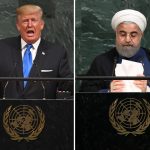In response to a worrying trend in U.S. politics, Lobe Log publishes Iran Hawk Watch every Friday. Our posts highlight and examine militaristic commentary about Iran from a variety of sources including news articles, think tanks and pundits.
*The last few weeks have been particularly busy for Iran watchers and some important arguments contradicting the case for war have been published. I will be posting a compilation of them soon. For now, see this must-read article by veteran Iran expert Gary Sick in CNN: Iran, U.S. need a crisis exit ramp.
Mainstream Media and Pundits:
Wall Street Journal: The Journal’s editorial board continues to push weekly hawkish unsigned articles about Iran that are rumored to be penned by columnist Bret Stephens (formerly editor-in-chief of the uber-hawkish Jerusalem Post and Commentary Magazine). Perhaps Stephens is reading Lobe Log (don’t hesitate to say hi, Bret!), because this week’s post is more carefully worded than usual. However, the argument here is essentially the same as in previous articles: Iran can’t be dealt with by anything except “force”. To get an idea of Stephens’s thinking, watch this CNN discussion he participated in with Iran experts on Fareed Zakaria’s GPS show. The claims he makes on CNN are very similar to the ones here, another testament to the theory that he’s writings these pieces.
Max Boot: The well-known neoconservative and Iraq war hawk calls Matthew Kroenig’s debunked arguments for attacking Iran “powerful” and claims he hasn’t seen any strong counterarguments yet:
If the U.S. is truly determined to prevent [Iran from getting a nuclear weapon]–and if we’re not, we should be–the most effective option is to use force.
…
I have yet to see (have I missed it?) an equally detailed and convincing exposition of the anti-bombing side.
There are of course several well-known and compelling antiwar arguments available, most notably by Harvard University’s Stephen Walt, which resulted in this exchange with Kroenig. I will post a compilation soon, but for now read Ali Gharib’s post on Boot, as well as this, this and this for more arguments against pro-war commentary.
Think Tanks and Analysts:
Patrick Clawson: In an article suggesting that Israel was behind the recent murder of yet another Iranian nuclear scientist, the Washington Institute for Near East Policy’s (WINEP) director of research endorses covert military attacks on Iran while saying they are preferable to a wider war. Clawson’s argument leads one to believe that only military options are available (strongly contradicted by two Cold War diplomatic veterans, among others):
Mr. Clawson said the covert campaign was far preferable to overt airstrikes by Israel or the United States on suspected Iranian nuclear sites. “Sabotage and assassination is the way to go, if you can do it,” he said. “It doesn’t provoke a nationalist reaction in Iran, which could strengthen the regime. And it allows Iran to climb down if it decides the cost of pursuing a nuclear weapon is too high.”
Clawson has a history of endorsing covert attacks against Iran. In 2006 he told the New Yorker’s Seymour Hersh that he would like to see “industrial accidents” rather than diplomatic efforts from the United States. Clawson also told Hersh that the U.S should be preparing for war in the meanwhile and 6 years later he’s still saying that military confrontation is likely.
Past and Present U.S. Officials and Politicians:
John Bolton: The former Bush administration official with close ties to Iraq war neoconservatives has no qualms about agitating for war on Iran. Bolton has a history of hawkishness and “insanity” about the country and how it should be dealt with. On Wednesday he told Fox News that sanctions and covert attacks won’t prevent a nuclear-armed Iran, but attacking “its nuclear weapons program directly” will.
Bolton’s argument for war has been contradicted by top analysts and officials including Secretary of Defense Leon Panetta, who recently said an attack on Iran’s nuclear facilities would “at best” delay its nuclear program by one or two years and would have disastrous consequences.
(This week Bolton endorsed Mitt Romney as the Republican presidential nominee and might join his advisory team. He was accordingly given the stage by the Washington Post’s far-right blogger, Jennifer Rubin, where he criticized the Obama administration’s stunted diplomacy efforts with Iran, calling the President “terribly inexperienced and naïve”.)
GOP Presidential Candidates: Micah Zenko and Emma Welch examine hawkish arguments about Iran by the Republican presidential candidates in the Los Angeles Times. They argue that the “most troubling” aspect of the candidates’ statements is the “complete absence of any details” about how war could prevent an Iranian nuclear bomb. They conclude:
Initiating a preemptive military strike against Iran to eliminate its suspected nuclear weapons capability would be an enormously significant — and potentially disastrous — foreign policy decision. As the Republican presidential campaign continues, the media and prospective voters must challenge the candidates for greater explanation on this application of military force. In Iraq, the U.S. discovered the enormous costs and consequences of trying to disarm a country through regime change. It is crucial, therefore, that we demand that those running for president clearly articulate a realistic strategy for preventing an Iranian bomb before placing “all options on the table.”




